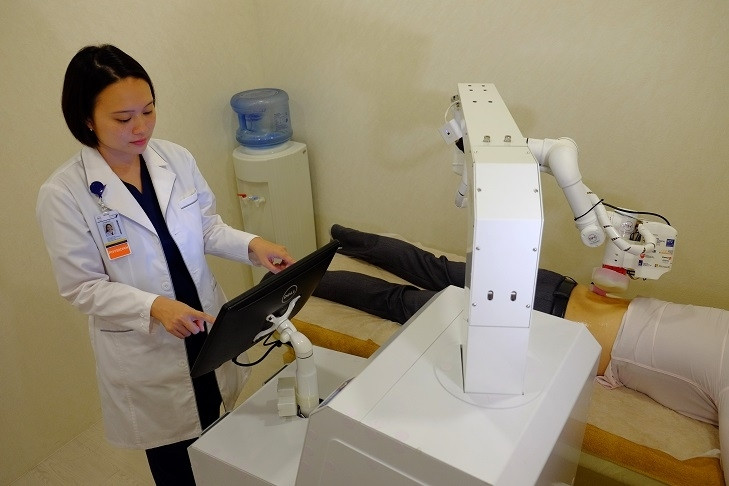The future of massages? AI-powered robo-masseuse 'Emma' starts work in Singapore
Medical clinic drafts in Expert Manipulative Massage Automation from start-up incubated by NTU Singapore.

A health clinic in Singapore has begun introducing patients to a high-tech robot that specialises in doling out massages.
Emma - which is short for Expert Manipulative Massage Automation - wields a fully articulated robotic limb with two heated silicon pads replicating a human palm and thumb. The robo-masseuse has been designed to tackle back and knee stiffness as part of the NovaHealth clinic's "Tui Na" treatments - a form of traditional Chinese medical treatment.
Emma reportedly cost around one million Singapore dollars (roughly half a million GBP) to develop. It was created by start-up AiTreat which is made up of Nanyang Technological University researchers and took around two years to develop.
Using sensors embedded within the silicon tips, a camera calibration system, and cloud-based artificial intelligence, Emma is capable of calculating the correct levels of pressure and motion to apply to specific 'acupoints' - areas marked out by a physician prior to the treatment.
The AI system can even track a patient's progress across multiple sessions and can produce a report showing their recovery path. In addition, should Emma become a little overzealous, AiTreat has added a handheld controller that lets the patient reduce the pressure.
Emma's trial, which began on 9 October, allows the NovaHealth clinic to drop the staff count usually required for 'acupoint' by two, as it performs the most labour-intensive part of the treatments. The robot is currently rented to the clinic at a cost of S$3,000 per month, which falls at the low end of a massage therapist's usual S$3,000-S$5,000 a month salary.
However, Emma is not yet capable of replacing all of the clinic's masseuses, as a therapist still has to set the massage positions and tend to the neck, wrist and ankle areas during each session. There's also the small matter of the clinic's other treatments such as acupuncture and cupping.
"Emma is designed to deliver a clinically precise massage according to the prescription of a qualified TCM physician or physiotherapist, without the fatigue faced by a human therapist," said Albert Zhang, an alumnus of NTU's Double Degree programme in Biomedical Sciences and Chinese Medicine.
"By using Emma to do the labour-intensive massages, we can now offer a longer therapy session for patients while reducing the cost of treatment. The human therapist is then free to focus on other areas such as the neck and limb joints which Emma can't massage at the moment."
Emma is far from the first AI-powered robo-rival for healthcare specialists. Elsewhere in Singapore a hospital is using robotics to bring down pharmacy waiting times while easing loads on pharmacists by automating 80% of medication dispensing.
© Copyright IBTimes 2025. All rights reserved.






















